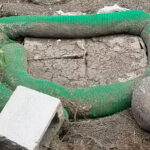Top: One Acre Farm in Dickerson, Maryland. Image courtesy Compost Crew
The Montgomery County (MD) Council unanimously passed legislation (ZTA 20-04) on February 9, sponsored by Councilmember Evan Glass, which increases the amount of off-site materials farmers can use on their property to produce and manufacture compost and mulch from 20 percent to 50 percent. “While the county currently lacks the infrastructure to compost food waste at a commercial scale, partnering with local farmers and local green entrepreneurs is a step toward fully harnessing the power of our land so that the county can reduce its waste and increase its climate goals,” says Glass.
Montgomery County — the most populous county in Maryland — produces 147,000 tons/year of food waste, the largest component of its solid waste stream. “At the same time, the county has 90,000 acres in land in agricultural reserves,” explains Brenda Platt, Director of the Composting for Community Project at the Institute for Local Self-Reliance in Washington, D.C., which has been advocating for a change in the county’s zoning law. “Even a horse farm couldn’t compost with the 20% limit. The new zoning law gives farmers more flexibility to compost and source their feedstocks from off their farms. The finished compost can only be used on their farms. Both rural as well as urban farms in the county are going to benefit.”
Councilmember Craig Rice, who also supported the legislation, notes “increasing composting opportunities for our local farms is a benefit for our agricultural and restaurant industries as well as a positive step in advancing our climate goals. By redirecting food waste, the largest contributing factor in the county’s waste stream, our farmers can use the organic material in their food production. This regenerative practice is key to reducing greenhouse gas emissions and creating a greener environment for future generations.”










